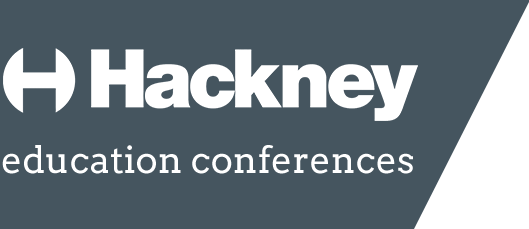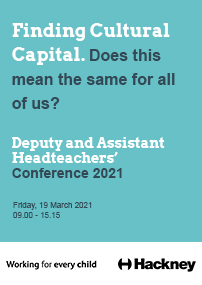Finding Cultural Capital – Does this mean the same for all of us?
Deputy and Assistant Headteachers’ Conference
Friday 19 March 2021, 9.00 – 15.15
Online conference
£150 (+VAT) per delegate or 2 free places if you have purchased the CPD package
Overview
This one day online conference will feature knowledge and ideas about Cultural Capital from a range of perspectives amidst the changing global and local landscape.
Internationally renowned speakers will share current thinking about Cultural Capital giving attendees a range of approaches they can use in their schools.
The day will start with a keynote address followed by workshops, promising to provoke thinking and showcase how collaboration creates possibilities for improving outcomes and promoting cultural capital.
Participants will be challenged to:
- reflect and think critically about cultural capital
- drive excellence through curriculum organisation and inclusive practices
- explore the concepts of character development, resilience and well-being
Who should attend?
Primary and secondary school:
- Deputy Headteachers
- Assistant Headteachers
- Senior Leaders
Programme
9.00 – Welcome: Anton Francic, Principal Secondary Adviser, School Performance and Improvement, Hackney Education
9.15 – Defining Cultural Capital: Phil Beadle, award winning teacher, broadcaster, journalist and author
Cultural Capital is a concept first defined by sociologist, Pierre Bourdieu, in 1977. Bourdieu defined it as a means of achieving social advantage and other forms of capital (economic and social). Since its earliest iteration, the concept has mutated, over time, to a current sense that there should be a series of cultural ‘entitlements’ that children should possess. Phil’s wide ranging speech will cover the history of this concept, its many controversies and how practitioners might apply it to students in modern day Hackney without demeaning their existing cultural wealth.
10.15 – Break
10.30 – Workshop One – see workshop tab for more details
Primary (run by Into Film) – expanding horizons with the creative use of film
Secondary (run by Phil Beadle) – the impact of teaching creatively in schools
11.25 – Workshop Two – see workshop tab for more details
Primary (run by Phil Beadle) – the impact of teaching creatively in schools
Secondary (run by Into Film) – expanding horizons with the creative use of film
12.15 – Lunch
13.00 – Black heroes of mathematics and their stories: Dr Nira Chamberlain, President, The Institute of Mathematics
A few years ago the film “Hidden Figures” told the true store of three Black mathematicians who helped NASA on it space program. Though they made a significant contribution, their work has until recently remain hidden. In this talk, we will talk about other Black mathematicians who have contributed significantly to the field. Hence, supporting the statements that mathematics is for everybody.
13.45 – Break
14.00 – Collaboration as a strategy for promoting equity in education – possibilities and barriers: Mel Ainscow CBE, Professor of Education, University of Glasgow, Emeritus Professor of Education, University of Manchester, Adjunct Professor, Queensland University of Technology
Many educators take the view that working together with others is a major means of achieving improvements in our schools. The danger is that this belief can distract attention from the complexities involved in achieving effective forms of collaboration. There is a related risk that politicians and policy makers – seeing collaboration as the silver bullet of educational reform – might decide to mandate it as a means of achieving success. In so doing, they may overlook how other policies make this difficult.
With these concerns in mind, this presentation will draw on Mel Ainscow’s extensive experience and research to provide guidance regarding the conditions that are needed in order to make collaboration work. It will focus in particular on the major challenge facing education systems around the world, that of achieving equity. In so doing, it will start from the assumption that, under the right conditions, learner diversity can be a catalyst for educational improvement.
The session will involve inputs and focused discussions about three interlinked sets of factors that impact on equity in education:
- Within school factors related to school and teacher practices;
- Between school factors that arise from the characteristics of local school systems; and
- Beyond school factors to do with the wider context within which schools operate.
The session will help participants to analyse their working contexts in order to develop strategies for promoting collaborative improvement. It will stress the importance of collecting and engaging with various forms of evidence in order to stimulate moves to create more inclusive practices. What is distinctive in this approach is that it is mainly led from within schools, with senior staff having a central role as ‘system leaders’.
15.00 – Closing remarks/conference evaluation
15.15 – End of conference
Workshops
Expanding horizons with the creative use of film – run by Into Film
In this session, delegates will be able to see how watching and learning with film, and the pedagogy developed over many years by Into Film and others (including the BFI), enables schools to embed film and filmmaking into teaching and learning practices and extracurricular activity. They will discover how this enriches the cultural capital in the school community with a particular emphasis on drawing in students facing various forms of disadvantage, including literacy learning. The session will include an overview of this approach and practical examples of use right across the curriculum for delegates to take straight back to school and put into action.
Into Film puts film at the heart of children and young people’s educational, cultural and personal development. More than half of UK schools currently engage with our programme of CPD/training and resources to support classroom teaching; Into Film Clubs and special cinema screenings. Into Film is a not-for-profit organisation supported principally by the BFI (through the National Lottery), Cinema First and Northern Ireland Screen.
The impact of teaching creatively in schools – run by Phil Beadle
Phil’s workshop looks at arts provision in schools and how the curriculum might be shaped to provide students with ‘distinction’. It looks at how the current recommended curriculum offer in the arts is intentionally racist, classist and sexist and how schools might make an arts offer that appears to conform to the extent that it would satisfy Ofsted, and that actually does offer access to ‘legitimate’ culture, but does so through a lens that examines the power structures that have contributed to the ‘tradition’.
It looks at how ‘legitimate’ culture validates the inherently meaningless, how the construction of certain critical forms of analysis of culture into cliché has worked and how we might use the dictates that we teaching ruling class culture as a means through which our students might create working class art.
Speakers
Phil Beadle
Phil is an award winning teacher, broadcaster, journalist and author of many books including one entitled ‘Rules of Mavericks: a Manifesto for the Disobedient’! He is an inspirational speaker who has a track record of success in supporting schools and teachers in challenging circumstances and it quickly becomes clear why he won the national teacher of the year award. Phil will be speaking and leading discussions particularly around creativity in the curriculum.
Professor Mel Ainscow CBE
Dr. Nira Chamberlain
Nira is about to become the President of the Institute of Mathematics. In 2018 he was the winner of the world’s most interesting mathematician award. He was the highest new entrant in the 2018 power list , also holding the title of the 5th most influential black person in the UK. Nira will be talking about the importance of mathematics for all and outline his route to his present position. With his 25 years’ experience and an international reputation Nira is a fascinating and challenging speaker.
Into Film
Into Film puts film at the heart of the educational and personal development of children and young people across the UK. It aims to give every young person between the ages of 5-18 the chance to experience film creatively. Into Film supports teachers and educators to achieve a wide range of effective learning outcomes in their use of film. Their programme includes a network of extra-curricular film clubs, resources for use in clubs and in the classroom training, a cinema-based film festival and an annual Awards Event. This is particularly pertinent in the light of character education and cultural capital emphasis in the new inspection framework.

